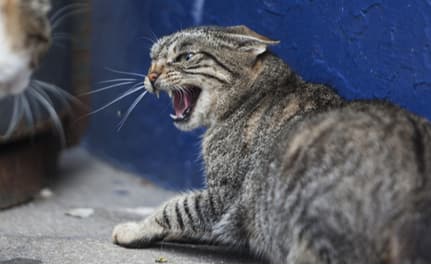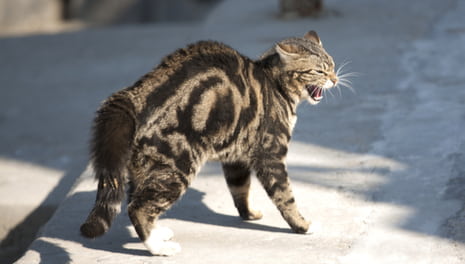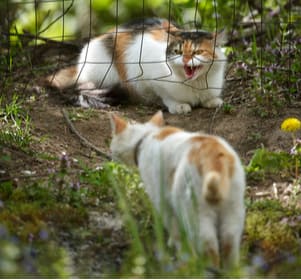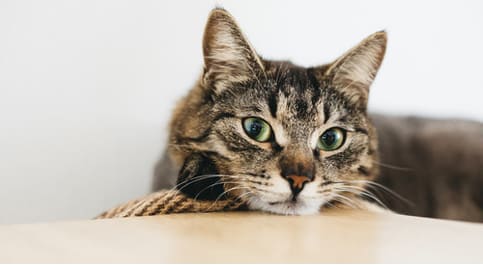
Your cat may be yowling and hissing for many reasons, such as:
- Pain
- Fear
- Stress
- Annoyance
- Social Issues
- Territorial
- Separation Anxiety
- Growing Old
If your cat is yowling and hissing, there are multiple ways to understand your feline’s issues. Before taking action, consult your veterinarian to better understand your cat’s needs.
While you may be used to your cat’s personalities and needs, sometimes their behaviors can be confusing, especially when there are so many reasons that they might be acting out.
When it comes to yowling and hissing, it’s important to determine the cause of your cat’s distress as soon as possible so that you can keep them happy and healthy. Here are 9 reasons why your cat might be displaying these symptoms and how to help them.
1. Pain Can Be a Leading Reason as to Why Your Cat Is Yowling and Hissing.

Cats are known for being excellent at hiding their pain. Your cat may be experiencing physical or mental issues, but you might not even be aware of it.
Cats hide their pain instinctually because in the wild, showing signs of weakness can put these predatory animals into the role of prey. In addition to this, your cat may not want to seem like the weak link to other pets in your home, so they may resort to hiding their pain.
Despite this, yowling and hissing are common signs of pain, in addition to:
- Hiding in unusual places
- Rigid body movements
- No longer curious or interested in previous activities
- Lack of personal care including missing the litter box and discontinuing grooming
- Being unusually vocal or less vocal than normal
If you suspect that your cat is yowling or hissing due to a source of pain, it’s important to contact a veterinarian IMMEDIATELY to determine the exact cause before taking action.
2. Fear Can Be a Dominating Emotion That Causes Your Cat to Lash out in Aggressive Manners.

Cats are naturally fearful of surroundings or circumstances that they aren’t used to. If your cat is lashing out aggressively with hisses and yowls, they could be fearful about something encroaching on their space.
In addition to yowling and hissing, your cat may exhibit other signs of fear, such as:
- Hiding
- Shaking/trembling
- Excessive grooming
- Arching or flattening their back
- Curling their body into a circle
- Enlarged pupils
- Growling and other vocalizations
- Aggression
If your cat is new to your household and is not accustomed to being around humans, they may react fearfully and you need to give them the proper space and time to adjust to the new space.
If your cat is yowling and hissing due to a new fear, it’s important to determine the cause as soon as possible so that your cat doesn’t remain in distress.
Fear in cats can be caused by many things, including:
- Loud and unexpected noises
- A new pet has come into their space
- Being moved to a new place
- Being around people they aren’t used to, such as children
Your cat may also be fearful of something specific due to negative past experiences. For example, if your cat responds by yowling and hissing anytime you attempt to put them into a carrier, it could be due to a bad time during their last travel.
Just like people, your cat can experience trauma and phobias. Understanding what triggers your cat’s fears will help you to eliminate this discomfort for you and your pet.
3. Stress Can Cause Your Cat to React in Many Ways, Including Yowling and Hissing.

Your cat is a creature of habit who enjoys living life the way he or she was raised to. If you’ve made a sudden change to your home or added another family member, your cat may be feeling the effects of stress.
Stress can cause many other adverse reactions in your feline, including:
- Vomiting and diarrhea
- Excessive grooming or lack of grooming
- Changes in appetite and sleep patterns
- Excessive sleeping and hiding
- Missing the litter box
- Spraying walls, furniture, and floors
- Frequent vocalization and attention-seeking
- Less activity and interaction with your family
The causes of stress in your cat’s life vary greatly, but may include:
- Moving into a new home
- Not having enough food, water, clean litter, or toys
- Being held or handled improperly
- Meeting new people or animals
- A new baby being born into the family
- Living in an area with feral cats living outside
- Loud construction or remodeling to the home
- An unexpected change in schedule or routines
Thankfully, most of the changes in your life are things that your cat will be able to adapt to. With your help, yowling and hissing due to stress is something that should be short-lived.
Here’s what you should try if your cat is experiencing symptoms of stress:
- Contact your local veterinarian for advice on the issue and to rule out other potential issues immediately.
- Provide your cat with a stable and steady environment where change is limited and gradual so that they can properly adjust to a new setting.
- Ensure your cat always has access to the things he or she needs to be happy and healthy, including fresh food and water, a clean litter box, a safe place to decompress and sleep, and toys to play with.
- Consult a professional on cat behaviors if the symptoms persist so that you can meet the needs of your cat accordingly.
4. Although Your Cat May Not Be Naturally Aggressive, He or She May Yowl or Hiss to Display These Feelings When They Arise.
Cats are predatory creatures who enjoy chasing and toying with their prey, however your cat may feel like a prey animal at times when it perceives a threat coming its way. This can instigate them to act out in aggressive manners.
Aggression in cats can be triggered by many things, including:
- Pain
- Fear
- Genetic issues
- Changes in their home or environment
- An obvious threat or territory issue with another animal
- Being provoked into a naturally aggressive response
Your cat may also have a naturally aggressive personality based on their past life experiences and the environment they’ve been raised in. For example, a cat who is less socialized to humans may react aggressively in certain situations and a more socialized cat may not.
In addition to yowling and hissing, your cat may also experience these symptoms of aggression:
- Arching their back
- Lashing their tail back and forth or thumping it on the ground
- Swatting and scratching
- Flattening their ears
- Growling and spitting
- Pouncing, attacking, and biting
A cat’s aggression can be a serious issue for many pet owners as they do not want to be harmed by their animal, nor do they want their cat to feel the need to be aggressive.
If your cat is displaying symptoms associated with aggression, it’s important to try and eliminate issues that may cause them to feel trapped or isolated in a triggering environment.
Additionally, if your cat is displaying serious signs of frequent aggression, you should contact your veterinarian to discuss potential remedies to this situation and rule out other reasons that your cat may be responding this way.
5. Similar to an Aggressive Cat, an Annoyed Cat May Send You Warning Signs by Yowling and Hissing.

Even if your cat has a calm and gentle personality, your pet may exhibit signs of annoyance if something is bothering them.
In addition to yowling and hissing, signs of annoyance may include:
- Lashing their tail back and forth
- Crawling, ducking, and moving away from you
- Growling or meowing with their ears flattened back
- Swatting or swiping
The sounds of your cats’ yowls and hisses will be low and quiet when they’re annoyed, and they use them to warn you about how they’re feeling. Warning signs can lead on to actual signs of aggression if your cat continues to feel threatened or provoked.
Your cat has its own personality and preferences; it’s important to pay attention to how your animal is feeling and what makes them happy versus what annoys them.
If your cat doesn’t appreciate something, he or she will let you know. It’s hard to say what specifically might be annoying your cat as this can vary depending on their temperament and environment, but these are a few things that could trigger them:
- Not having access to their food, water, or litter box
- Another animal bothering them
- Being handled improperly
- Feeling cornered or trapped
Be diligent about identifying the source of your cat’s annoyance before it escalates into genuine anger, aggression, fear, or stress.
6. Feral or Unsocialized Cats Tend to Yowl or Hiss in Uncomfortable Situations.
If you recently adopted your furry friend from an animal shelter, rescue, or off the streets, they might not be fully socialized. When this happens, your cat may feel defensive in your home because they aren’t used to being around people.
A feral cat is a cat who has no experience being around humans and is only adjusted to living outside. If a feral cat is over 4 months old, it’s highly unlikely that they will ever become socialized and able to live with people.
If you’re trying to interact with a feral cat, it is best to let them continue to live outdoors where they are comfortable. Kittens under four months old have a higher chance of being socialized as they are still learning and can feel comfortable around humans.
On the other hand, a stray cat is a cat who has minimal contact with humans or previously had contact but no longer does. As time goes on, a stray cat can turn feral if interactions with people are completely severed, however stray cats have the chance to be socialized.
If your cat is yowling or hissing because they aren’t used to you yet, there are ways to help them feel more at home and to socialize them. These include:
- Providing your animal with fresh food, water, litter, and toys
- Providing them with a safe space where they can distance themselves if desired
- Interacting with them frequently
- Talking to them in a quiet and gentle tone
- Handling and touching them gently and in a neutral area (if they allow)
- Giving them treats and offering them food out of your hand
- Slow, easygoing movements so as not to startle them
The biggest factor in socializing a yowling and hissing cat is to be patient. Your cat will not learn to trust you by feeling rushed and scared, but instead by feeling supported and loved through the process.
7. Your cat’s space is important, and when they feel like their territory is being threatened, they may act out as a result.

No matter what your cat’s personality is like, felines are naturally predisposed to being territorial about their space. Some cats display dominance over their territory more prominently than other cats, specifically males.
Your cat may feel territorial when another cat encroaches on their space, whether by entering the neighborhood nearby or if you add another cat to your home.
Your cat may also feel bothered by other animals or humans if they’re especially territorial about where they live.
In addition to yowling and hissing, your cat may exhibit other signs of being territorial, such as:
- Marking their territory by scratching or spraying urine on surfaces
- Stalking and attacking the cat or other animal intruding on their territory
- Rubbing their body against nearby surfaces
- Walking around their territory and growling/vocalizing
A territorial cat may also become offensive or defensive, depending on the nature of the situation.
If your cat is feeling offensive, they might:
- Stare down the animal or person intruding on their territory
- Move toward the intruder with stiff and hunched body language
- Loudly vocalize, including yowling and hissing
If your cat is feeling defensive, they might:
- Crouch down low and protect their body
- Quickly swipe at the animal or person intruding on their territory
- Let out low meows, growls, hisses, and whines
If your cat is exhibiting signs of being territorial, the first step is to find out what is causing this reaction. Triggers for being territorial might include:
- Adding a new member to the household such as a baby, roommate, or another animal
- Moving to a new location, especially one with feral cats living outside
- New animals entering the neighborhood such as feral cats or a neighbor’s dogs
- Changes to their environment such as new or rearranged furniture
It’s important not to try and engage your cat when they are feeling territorial, especially if they are on the offense.
Your main priority should be attempting to remove or alleviate the cause of their negative feelings and provide them with a safe outlet to expel those feelings elsewhere, such as via new toys, food, or even a fun cat scratcher.
8. If Your Cat Is Feeling Lonely, Yowling and Hissing Are Two Ways They Might Express This to You.

Cats are stereotypically known for being incredibly independent creatures, and while this is partly true, it’s also true that your cat enjoys your company and will form a bond with you and other members of the family.
This means that when you break a normal routine or leave for extended periods of time, your cat may start to feel separation anxiety.
Separation anxiety is very common in cats, even though it’s not always an easy thing to spot. The most typical signs of separation anxiety are:
- Excessive meowing
- Yowling around the house
- Missing the litter box and going to the bathroom on your belongings
- Excessive grooming
- Hiding away and sleeping more than usual
There are several reasons that your cat may be feeling separation anxiety, such as:
- Being taken away from their mother cat at too young of an age
- Changes in their home and environment
- Changes in their personal schedules and routines
- The loss of another animal or family member
- Lack of entertainment such as via toys, cat furniture, and playtime with you or other animals in the family
- Health or genetic problems
In order to help your cat work through their separation anxiety, it’s important to provide them with a structured home where they feel safe and secure. Sometimes, even when your cat has a good routine in place, they can still get lonely without your company.
In these situations, you can try to:
- Offer your cat extra toys and ways to entertain themselves while you’re away such as cat furniture, scratchers, puzzle feeders, or even just a set of crinkle balls to play with
- Set up a special pet camera to watch your cat from outside of the home and even interact with them from far away depending on the type you purchase
- Ensure your cat has access to fresh food, water, and clean litter, as well as plenty of things to do right before you leave the house
- Ask a friend or family member to spend time with your cat if you know that you’ll be gone for an extended period of time
If your cat continues to have behavioral issues due to separation anxiety, especially if they are yowling and hissing frequently, then it may be best to get in touch with a veterinarian or behavioral specialist. They might recommend alternative methods to help your kitty, such as medication.
9. If Your Cat Is Getting Older, There Are Many Reasons That Their Age May Be Causing Them to Yowl and Hiss.

As your cat gets older, it won’t just show up in their physical features. In addition to your cat’s fur not looking as sleek as normal, he or she might also start to experience similar ailments that an aging human might – including cat dementia.
Cat dementia is most common in cats that are 10 years old or older, and while there isn’t a ton of research on the disease, there are a set of symptoms as outlined by Lisa Radosta, who, according to the Florida Veterinary Behavior Science website, is “one of only 69 board certified veterinary behaviorists in the United States.”
These symptoms include:
- Yowling and howling, especially during the nighttime
- Improper litter box usage and going to the bathroom around the house
- Excessive sleeping
- Lack of grooming
- Becoming confused about their normal routines
- Interacting less with their family
- Sleeping more than normal
When it comes to an older cat, you can’t always rule these symptoms out as simply being related to a little elderly kitty confusion. Instead, it’s important to consult with your veterinarian to be sure that your cat isn’t experiencing other issues, such as problems with their kidneys or bladder.
If your cat is diagnosed with cat dementia or another similar ailment as they get older, you may notice that they vocalize with yowls and hisses even when you’re not in the room.
There are many ways that you can help your elderly cat through these confusing times, such as:
- Consulting your vet about possible supplements and medications to assist them
- Providing enough fun and enrichment so that your cat’s brain and body stay active
- Engaging your cat with new foods, treats, activities, and toys frequently
If all else fails, veterinarians and veterinary behaviorists can identify deeper issues and work to help your cat’s needs specifically.
Sources
https://www.hillspet.com/cat-care/healthcare/signs-cat-is-hiding-its-pain
https://www.basepaws.com/blog/fears-and-anxiety-in-cats-do-you-have-a-fearful-kitty/
https://www.embracepetinsurance.com/waterbowl/article/fear-in-cats
https://pets.webmd.com/cats/guide/cats-excessive-meowing#1
https://www.battersea.org.uk/pet-advice/cat-care-advice/reducing-your-cats-stress
https://www.catster.com/cat-behavior/the-signs-of-an-annoyed-cat-and-what-annoys-cats-the-most
https://www.alleycat.org/resources/feral-and-stray-cats-an-important-difference/
https://www.aspca.org/pet-care/cat-care/common-cat-behavior-issues/aggression-cats
https://petcube.com/blog/cat-separation-anxiety/
https://www.catster.com/cat-health-care/cat-dementia-is-your-cat-at-risk
https://www.flvetbehavior.com/
https://www.litter-robot.com/blog/2016/08/29/how-to-help-skittish-kitty/
https://www.dvm360.com/view/helping-owners-handle-aggressive-cats
https://www.avma.org/javma-news/2017-11-01/study-describes-pet-cat-personality
https://www.alleycat.org/community-cat-care/returning-the-cats/
https://www.alleycat.org/community-cat-care/socializing-kittens/
https://www.alleycat.org/community-cat-care/soothe-a-stray/
https://www.paws.org/resources/aggression/
https://www.petmd.com/cat/behavior/how-deal-territorial-behavior-cats
https://www.medicanimal.com/Understanding-Separation-Anxiety-In-Cats/a/ART111499
https://pets.webmd.com/cats/kidney-failure-uremia-symptoms-cats#1